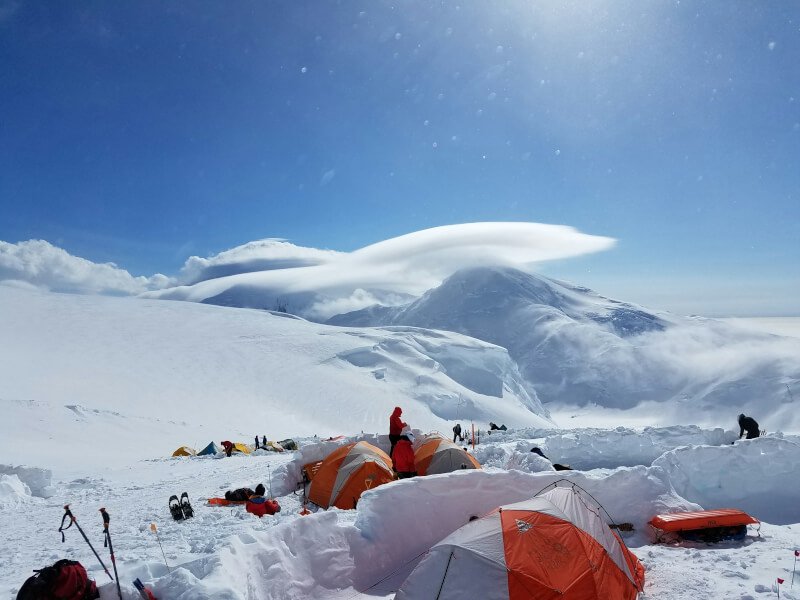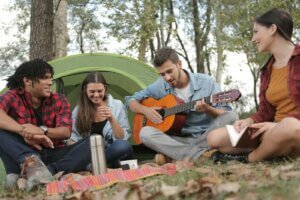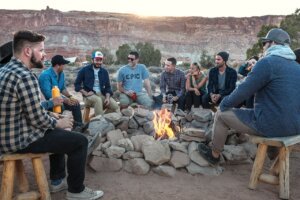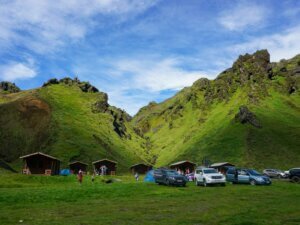Imagine escaping the daily hustle and bustle, diving headfirst into breathtaking landscapes, and creating lifelong memories. Organized camping trips offer the perfect opportunity to disconnect from the chaos and reconnect with nature. As you embark on a journey filled with adventure and companionship, you’ll discover the joys of exploring serene forests, roasting marshmallows under starlit skies, and bonding with fellow outdoor enthusiasts. With carefully curated itineraries, experienced guides, and hassle-free logistics, organized camping trips provide the ultimate escape for nature lovers and adventurers alike.
Benefits of Organized Camping Trips
Camping trips offer numerous benefits for individuals of all ages. Whether you are a beginner or a seasoned camper, organized camping trips provide a range of advantages that can enhance your overall well-being and quality of life. By embarking on these outdoor adventures, you can enjoy improved health and fitness, engage in social interaction, develop essential skills, and gain environmental awareness.
Health and Fitness
One of the most significant benefits of organized camping trips is the positive impact they have on your health and fitness. Spending time in nature allows you to disconnect from modern technology and stresses, which in turn promotes relaxation and reduces anxiety. Additionally, engaging in outdoor activities such as hiking, swimming, and canoeing can improve cardiovascular health, increase stamina, and build strength. Breathing in fresh air and being exposed to natural sunlight also provides a boost to your immune system, leading to an overall improvement in your well-being.
Social Interaction
Organized camping trips provide a fantastic opportunity to connect and bond with others through social interaction. Whether you are going on a trip with your family, friends, or participating in a group camp, you will have the chance to meet new people and develop meaningful relationships. Engaging in activities together, sharing meals around the campfire, and spending time exploring the great outdoors creates a sense of camaraderie and fosters teamwork. These interactions can result in lifelong friendships and provide a support network that extends beyond the camping experience.
Skill Development
Participating in organized camping trips allows you to develop and refine a wide range of skills. As you engage in outdoor adventures like hiking, kayaking, or rock climbing, you will enhance your physical abilities, coordination, and problem-solving skills. Camping trips often offer the opportunity to learn essential survival skills such as fire-making, navigation, and first aid. These practical skills not only enable you to feel more confident and independent in the wilderness but can also be invaluable in emergency situations. Through camping, you can acquire valuable life skills that can be applied to various aspects of your life.
Environmental Awareness
Organized camping trips also promote environmental awareness and a deeper appreciation for the natural world. Spending time immersed in nature allows you to experience firsthand the beauty and fragility of the environment. You will develop a greater understanding of the importance of preserving and protecting our natural resources. Furthermore, organized camping trips often include educational workshops and activities that highlight sustainable practices and environmental conservation. By participating in these initiatives, you can play an active role in caring for the planet and inspire others to do the same.
Choosing the Right Organized Camping Trip
When selecting an organized camping trip, it is essential to consider various factors to ensure that you have the best experience possible. Taking the time to research and evaluate different options will help you make an informed decision that aligns with your preferences, needs, and interests.
Considerations
Before choosing a camping trip, it is crucial to assess your camping experience level, physical fitness, and specific goals for the trip. Determine whether you prefer a guided trip or self-guided adventure, as well as the length of the trip. Consider your budget, available vacation time, and any particular requirements or limitations. Understanding your own preferences and limitations will enable you to select a camping trip that suits you best.
Trip Types
There are various types of organized camping trips to choose from, each offering a unique experience. Some popular options include family camping trips, group camping trips, wilderness backpacking trips, and adventure camping trips. Family camping trips are ideal for those looking to spend quality time with loved ones, while group camping trips provide an opportunity for socializing and teamwork. Wilderness backpacking trips are perfect for seasoned campers wanting to venture into remote areas, while adventure camping trips offer thrilling activities such as zip-lining, rock climbing, and spelunking.
Destination Selection
Choosing the right destination is important to ensure that you have an enjoyable and fulfilling camping experience. Consider factors such as climate, terrain, accessibility, and safety. Research different campgrounds, national parks, and wilderness areas to find a location that aligns with your preferences. Whether you prefer beachfront camping, mountainous landscapes, or lush forests, there are countless options available. It is also crucial to consider any permits or regulations that may be required for certain destinations.
Timeline and Preparation
Once you have chosen the right organized camping trip, it is important to plan and prepare accordingly to ensure a smooth and enjoyable adventure. Proper registration and booking, creating a packing checklist, and physical and mental preparation are essential steps to take before embarking on your camping trip.
Registration and Booking
Before your camping trip, ensure that you complete the necessary registration and booking process. This may involve contacting the trip organizer, providing essential information, and making any required payments. Secure your spot early to avoid disappointment, as organized camping trips can fill up quickly, particularly during peak seasons. Double-check all the details provided to ensure that you have the correct dates, meeting points, and any specific requirements for the trip.
Packing Checklist
Creating a comprehensive packing checklist is crucial for a successful camping trip. Consider the duration of your trip, the climate and terrain of your destination, and the activities you will be engaging in. Include essential items such as a tent, sleeping bag, camping stove, cooking utensils, and appropriate clothing for various weather conditions. Don’t forget to pack toiletries, first aid supplies, bug repellent, sunscreen, and any personal medications or equipment you may require. It is also important to pack lightweight and compact items to ensure ease of transportation.
Physical and Mental Preparation
Preparing yourself physically and mentally for your camping trip will contribute to a more enjoyable experience. Engage in regular physical exercise leading up to the trip to improve your stamina and endurance. Consider practicing specific activities such as hiking or canoeing to build up your skills and confidence. Mental preparation involves familiarizing yourself with the trip itinerary, researching and studying the destination, and mentally preparing for any challenges or unexpected situations that may arise. Being physically and mentally prepared will enhance your overall camping experience and allow you to fully immerse yourself in the adventure.
Activities and Itinerary
Organized camping trips offer a wide range of activities and itineraries to cater to different interests and preferences. Whether you are looking for outdoor adventures, team-building exercises, or educational workshops, there are plenty of options to choose from.
Outdoor Adventures
One of the main highlights of organized camping trips is the opportunity to engage in various outdoor adventures. Depending on your destination and trip type, you may have the chance to go hiking, backpacking, mountain biking, fishing, or even whitewater rafting. These activities provide an exhilarating and immersive experience in nature, allowing you to explore and appreciate the natural beauty surrounding you. Engaging in outdoor adventures also promotes physical fitness, builds confidence, and offers opportunities for personal growth.
Team Building Exercises
Many organized camping trips incorporate team-building exercises to foster social interaction and enhance cooperation among participants. These activities are designed to encourage teamwork, problem-solving, communication, and leadership skills. From trust falls and group challenges to ropes courses and scavenger hunts, team-building exercises create a sense of unity and strengthen relationships within the group. These activities can be particularly beneficial for corporate retreats, school trips, or any group setting where effective teamwork is essential.
Educational Workshops
Organized camping trips often include educational workshops and seminars that aim to enhance knowledge and awareness about various topics. These workshops may cover subjects such as wilderness survival skills, wildlife conservation, environmental sustainability, and Leave No Trace principles. Expert instructors and guides provide valuable insights and hands-on experiences, allowing participants to deepen their understanding and appreciation for the natural world. Educational workshops provide an opportunity for personal growth, inspire a love for nature, and promote responsible outdoor practices.
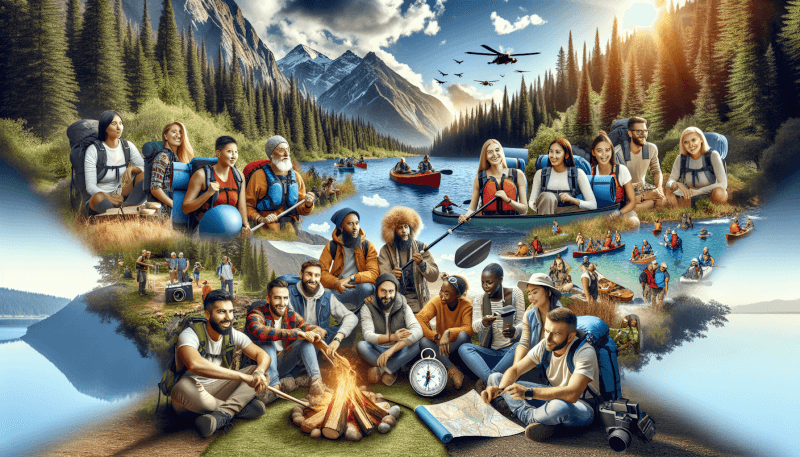
Safety Measures
Safety should be a top priority when participating in organized camping trips. It is crucial to be aware of emergency protocols, have access to first aid and medical support, and ensure that equipment and gear are used safely.
Emergency Protocols
Before embarking on a camping trip, familiarize yourself with the emergency protocols established by the organizers. These protocols may include procedures for severe weather conditions, medical emergencies, lost or missing participants, or incidents involving wildlife. Be aware of the designated meeting points, emergency contact numbers, and how to signal for help. It is important to follow these protocols diligently to ensure the safety and well-being of all participants.
First Aid and Medical Support
Having access to first aid and medical support is essential during camping trips. Ensure that there are adequate first aid supplies available and that there is at least one person trained in first aid within the group. Familiarize yourself with basic first aid techniques and common injuries that may occur while camping. If any participants have specific medical conditions or allergies, make sure to inform the trip organizers in advance and provide any necessary documentation or medications.
Equipment and Gear Safety
When participating in organized camping trips, it is crucial to prioritize equipment and gear safety. Before the trip, thoroughly inspect all camping equipment, including tents, sleeping bags, cooking stoves, and ropes, to ensure they are in good condition and functioning properly. Familiarize yourself with the correct usage and safety guidelines for each piece of equipment. It is important to wear appropriate clothing and footwear for the activities and weather conditions, and always use safety equipment such as helmets or life jackets when required.
Campsite Setup and Facilities
Setting up a comfortable and functional campsite is crucial to ensure a pleasant camping experience. Proper tent and shelter arrangements, kitchen and cooking setups, and washroom and sanitation facilities are essential considerations.
Tent and Shelter Arrangements
Selecting the appropriate tent and arranging it properly is key to a comfortable night’s sleep. Consider the size of the tent needed to accommodate the number of participants and any additional gear. Ensure that the tent is set up on level ground, away from potential hazards such as tree branches or rocky terrain. It is helpful to practice setting up the tent before the camping trip to familiarize yourself with the process and identify any issues. Additionally, consider additional shelter options such as tarps or hammocks to provide extra protection from the elements.
Kitchen and Cooking Setup
Preparing meals while camping requires careful planning and organization. Set up a designated outdoor kitchen area that is away from the sleeping area and properly equipped with cooking utensils, a camping stove, fuel, and a cooler for perishable food items. Create a meal plan in advance to ensure that you have enough food and that it can be prepared easily in the outdoor setting. Practice basic cooking techniques for camping, such as using a portable grill or cooking on an open fire, and ensure that all participants are aware of proper food handling and cooking safety.
Washroom and Sanitation Facilities
Maintaining proper hygiene and sanitation is essential during camping trips. Plan for suitable washroom facilities, whether it is a campground restroom, portable toilets, or a designated outdoor latrine. Regularly clean and sanitize these facilities to ensure they remain hygienic throughout the trip. Provide adequate handwashing stations with biodegradable soap and disposable paper towels or hand towels. Encourage participants to follow proper waste disposal practices and educate them on Leave No Trace principles to minimize environmental impact.
Food and Nutrition
Proper meal planning and nutrition are important considerations during camping trips to ensure that all participants are well-nourished and satisfied throughout their adventure.
Meal Planning
Creating a meal plan in advance can streamline the cooking process and ensure that you have enough food for the duration of the camping trip. Consider the dietary preferences and restrictions of all participants, as well as any special dietary requirements. Plan for a balanced variety of meals that include proteins, carbohydrates, fruits, vegetables, and snacks. Opt for lightweight and easily transportable food items that require minimal preparation. It is also helpful to pack non-perishable snacks for quick energy boosts during outdoor activities.
Special Dietary Requirements
Accommodating special dietary requirements is important to ensure that all participants can enjoy their meals without any discomfort or health risks. Communicate any specific dietary needs or restrictions to the trip organizers in advance. Whether it is vegetarian, vegan, gluten-free, or allergies to specific ingredients, these requirements can be incorporated into the meal planning process. If necessary, bring along extra provisions that cater to individual dietary needs.
Storage and Cooking Techniques
Proper storage and cooking techniques are essential for maintaining food safety during camping trips. Ensure that any perishable food items are stored in a cooler with sufficient ice to keep them at a safe temperature. Separate raw food items from cooked or ready-to-eat food to avoid cross-contamination. Cook food thoroughly to kill any harmful bacteria and prevent foodborne illnesses. Familiarize yourself with outdoor cooking techniques such as using a camping stove, Dutch oven, or campfire cooking, and follow all safety guidelines.
Leadership and Guidance
Organized camping trips often provide the opportunity for leadership and guidance from experienced trip leaders. These leaders play a crucial role in ensuring a smooth, safe, and enjoyable camping experience for all participants.
Experienced Trip Leaders
Having experienced trip leaders overseeing the organized camping trip provides guidance, expertise, and a sense of security. Trip leaders are typically knowledgeable individuals who have extensive experience in camping, outdoor activities, and wilderness navigation. They are responsible for planning the itinerary, coordinating logistics, and ensuring the safety of all participants. Trip leaders also serve as mentors and role models, providing support and encouragement for participants throughout the trip.
Skills Development Programs
Many organized camping trips include skills development programs to nurture participants’ abilities and provide opportunities for personal growth. These programs may involve workshops or hands-on training in various areas such as fire-making, navigation, wilderness survival, and first aid. By engaging in these programs, participants can acquire valuable skills and knowledge that can be applied not only during the camping trip but in their daily lives as well. Skills development programs also encourage self-confidence, problem-solving, and teamwork.
Mentorship Opportunities
Organized camping trips provide unique mentorship opportunities for participants of all ages. Whether through formal mentorship programs or informal interactions with trip leaders, participants can receive guidance, support, and inspiration. Mentors can offer valuable insights, share personal experiences, and provide advice on various aspects of camping and outdoor activities. Mentorship opportunities foster personal and character development, create lasting memories, and encourage lifelong engagement with the outdoors.
Costs and Budgeting
Before embarking on an organized camping trip, it is important to consider the costs involved and budget accordingly. Understanding the trip fees, additional expenses, and financial aid options will help you plan your resources effectively.
Trip Fees
Organized camping trips typically have associated trip fees that cover various aspects of the experience. These fees may include accommodation, meals, transportation, permits, and equipment rental. The cost of the trip can vary depending on factors such as the duration, destination, activities, and level of comfort provided. It is important to carefully review the trip itinerary and inclusions to understand what is covered by the fees and what additional expenses you may need to account for.
Additional Expenses
In addition to the trip fees, there may be additional expenses to consider when budgeting for an organized camping trip. These expenses can include personal gear and equipment purchases, optional activities or excursions, souvenirs, and any necessary vaccinations or travel insurance. It is advisable to set aside a contingency fund for unexpected expenses or emergencies that may arise during the trip. By budgeting for these additional expenses in advance, you can ensure that you have the resources needed for a stress-free camping experience.
Financial Aid Options
For individuals who may require financial assistance, there are often financial aid options available for organized camping trips. Some organizations or trip organizers offer scholarships or grants to help offset the costs of the trip. These financial aid programs may be based on criteria such as financial need, age, educational goals, leadership potential, or specific interests. It is recommended to research and inquire about these options well in advance to determine if you qualify and to complete any required applications or documentation.
Post-Trip Reflection and Impact
Following an organized camping trip, it is important to reflect on the experience and consider the impact it has had on your personal development, community engagement, and sustainable practices.
Learning Evaluation
Take the time to evaluate and reflect on the learning outcomes and personal growth achieved during the camping trip. Consider the skills you have acquired or developed, the challenges you have overcome, and the new perspectives gained. Reflect on how the experience has influenced your attitude towards the environment, teamwork, and personal resilience. Use this evaluation as a tool for continuous self-improvement and to identify areas for future development.
Community Engagement
Engagement with the community is a vital aspect of the impact of organized camping trips. Consider how you can share your experience and knowledge with others, whether it is through storytelling, volunteering, or mentoring. Encourage others to engage with the outdoors and promote responsible outdoor practices. By actively engaging with the community, you can inspire others to explore nature, foster a love for the environment, and create a culture of conservation.
Sustainable Practices
Organized camping trips often emphasize and promote sustainable practices to minimize their environmental impact. Reflect on the sustainable practices you have learned during the trip, such as Leave No Trace principles, waste reduction techniques, and eco-friendly camping practices. Incorporate these practices into your daily life, share them with others, and advocate for their implementation in outdoor activities. By practicing sustainable behaviors, you can contribute to the preservation of natural resources and create a positive impact on the environment.
In conclusion, organized camping trips offer a myriad of benefits, including improved health and fitness, social interaction, skill development, and environmental awareness. By considering factors such as trip types, destination selection, and proper preparation, you can choose the right camping trip that suits your preferences and needs. Engaging in outdoor adventures, team-building exercises, and educational workshops allows for an immersive and enriching experience. Prioritizing safety measures, setting up a functional campsite, and planning for proper food and nutrition ensure a comfortable and enjoyable camping trip. The leadership and guidance provided by experienced trip leaders, as well as the opportunities for skills development and mentorship, contribute to personal growth and memorable experiences. Understanding the costs and budgeting effectively, as well as reflecting on the post-trip impact, enables a well-rounded and transformative camping experience. By participating in organized camping trips, you can create lasting memories, gain valuable skills, and develop a deeper appreciation for the natural world.

